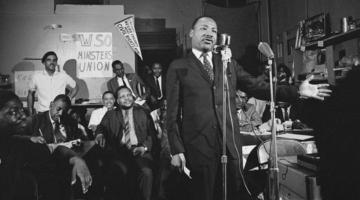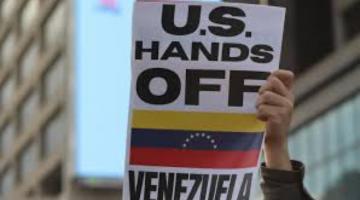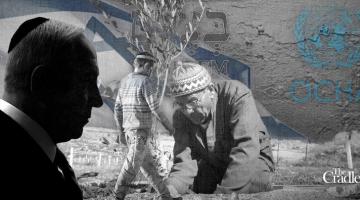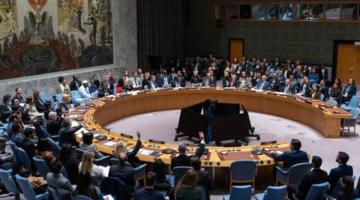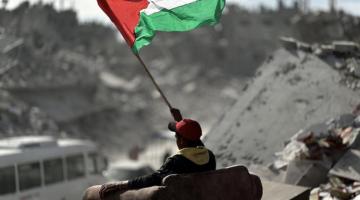It shouldn't need to be said at this late date, but imperialism and settler colonialism are the pertinent issues to address in any discussion of Zionism.
The foundational issue in the ongoing and existential conflict between Israeli settlers and indigenous Palestinians, not a continued and historical hatred of Jews, as many Zionists claim. But why do we make the distinction that opposition to Zionism is not automatically opposition to Jewish people? I believe that to understand this is to understand what Zionism is and the contradictions therein.
First, Zionism itself is not entirely synonymous with Judaism. Although it is true that the Zionist movement was “officially” organized by Theodor Hertzl in Austria in 1896 to establish a Jewish homeland in response to the bigotry and repression against Jews, it is important to understand that Hertzl was not himself an Orthodox, or “observant” Jew; he was more secular than religious.
Hertzl, according to the website JewishHistory.org, did not envision a Jewish homeland as a place that Jews like himself who were fully assimilated into Western society would want or need to emigrate to. Rather, Hertzl viewed a Jewish homeland as a place where poor Jews from Eastern European nations who did not assimilate into those societies could relocate and rebuild their lives in peace.
But from the beginning, there was always a conflict among the proponents of Zionism regarding the role of the Jewish religion in the movement. Hertzl considered Zionism a purely practical solution to Jewish persecution, providing a way to materially save Jewish people without focusing too much if at all on promoting or preserving Jewish religious tradition. This was the posture of the first four Zionist Congresses, which adopted resolutions that were neutral on the issue of the Jewish religion, identified then as “Jewish culture,” declaring that the movement would never do anything to oppose the Jewish faith, but it would also not do anything to support or promote it, either.
Even under the leadership of Chaim Weizman, who succeeded Hertzl after his death, the place of Jewish religious tradition within Zionism was still a matter of conflict. Weizman did not see Zionism as representative of the assimilationism, formality, and Western-influenced Jews of Hertzl’s camp, but as a movement that should represent the oppressed Jewish masses from Eastern Europe and their modesty and simplicity. This was not only a matter of what class of Jews the Zionist movement would be directed by and would serve, but what culture that movement would impart to Jews within the movement and what Zionism would present to the world.
But while it seemed that Weizman was more opposed to the class element that Hertzl’s vision projected for Zionism, the traditional Eastern European Jews of the time believed that Jewish religious tradition needed to be central to Zionism, while the Western European Jews felt the opposite. So internal debate on the role of the Jewish religious tradition in Zionism was not purely a class issue among the rank and file, but was also dictated by regional differences as well. And these differences even fell along political lines. For instance, Socialist-Marxist Jews did not believe Zionism should focus on religion at all. This was in opposition to the views of Jews who were more politically conservative or right-wing.
These differences of opinion on the role of the Jewish religion in the early establishment of Zionism persist to this day, as do other contradictions. According to the website JewishUnpacked.com, which is not an anti-Zionist outlet at all, there are still Six Different Types of Zionist Thinking. They are: political, labor, revisionist, religious, cultural, and diasporic. All of these support the establishment of a Jewish/Zionist state, but with disparate views on realizing it or what it should look like.
I raise these different schools of thought within Zionism to highlight the most important point among most of them, the one crippling and consequential flaw in all but two of them: that the desire and certainly necessity to create a safe haven for oppressed Jewish people was pursued by Zionists without much, if any, regard for the indigenous Arab population of Palestine.
For example, while early Political Zionists believed in a gradual immigration of Jews to settle Palestine, Revisionists believed in rapid mass Jewish immigration in order to claim sovereignty over all of “Biblical Israel” and establish a single state “on both sides of the Jordan River.” Also, while other Zionist leaders wanted to work with the British who colonized and controlled Palestine at the time because they believed the British would eventually transfer power to them, Revisionists didn’t trust the British and believed that they would have to fight and win their own sovereignty over Palestine.
This is a problem, first, because both Revisionists and other Zionists believed that British colonists had a right to give them control over Palestine or that they had a right to fight so they could control Palestine, rather than considering recognizing the sovereignty of PALESTINIANS over their own land.
Then, Diasporic Zionists expanded the definition of a “Zionist” to include those who supported the idea of Jewish nationalism but who did not need to settle in Palestine to establish a Jewish homeland there.
The article on the different types of Zionism cites U.S. Supreme Court justice Louis Brandeis who said, “Every Irish American who contributed toward advancing home rule was a better man and a better American for the sacrifice he made. Every American Jew who aids in advancing the Jewish settlement in Palestine…will likewise be a better man and a better American for doing so.”
But the problem with that comparison is that the Irish were fighting for freedom FROM colonization by Britain, even when they immigrated to the US from Ireland to escape colonial repression, poverty and starvation. Conversely, Zionists were fighting TO COLONIZE Palestine by forcibly displacing the indigenous population of Arab Palestinians, which is decidedly not the same fight the Irish in the US were engaged in.
Interestingly two of the six schools of Zionist thought do recognize the problem of disenfranchising the indigenous Palestinian population in establishing a Jewish state. Cultural Zionism focuses more on advancing Jewish culture through the teaching of Jewish history, Jewish texts, language, literature, music and art, and establishing Israel as a culture hub for the Jewish diaspora. Its main proponent, theologian, philosopher and committed Zionist Martin Buber argued not only that there must be Arab-Jewish reconciliation before a Jewish state could be established, but he also advocated for a one-state solution that accommodated the claims to the land of both peoples.
Then there is Religious Zionism, in which religious Jews living in Palestine initially viewed the first wave of European Jewish settlers (who were largely secular or openly anti-religious) as “New Jews,” who they believed would create a Jewish society devoid of traditional religious expression where the Orthodox Jewish community would not be welcome. These religious Jews also did not adhere to the Zionist ideology and believed that establishing the state of Israel was a violation of the Three Oaths in the Talmud, which states that Jews vowed not to reclaim Biblical Israel by force and would not do so themselves until the Messiah came to do it as promised if the other nations would not oppress the Jews too badly.
However, a movement to convince these religious Jews opposed to Zionism created a religious case for it that proclaimed that Zionism itself was the messianic redemption of Jews, rather than the need to wait for a Jewish Messiah to return for redemption to occur. Religious Zionism did this by arguing that one of the three oaths was violated - Jews were persecuted by other nations very badly - therefore Jews were no longer beholden to maintain their end of the deal. So, over time, some religious or observant Jews were won over to Zionism.
It is important to note, nevertheless, that there is still a large segment of Orthodox Jews who oppose the establishment of Israel on the religious grounds stated above. One of those groups, and perhaps the most vocal and visible, at least in the US, is the Neturei Karta, which is among other Orthodox Jewish communities in Jerusalem that have been consistent targets of Israeli oppression along with Palestinian Muslims and Christians, as well as Ethiopian and other African-descended Jews and immigrants.
So Israel is a state that exists through the logic of indigenous dispossession and apartheid. There is one set of rights and freedoms for European-descended Zionist immigrants and their descendants. But this set of rights depends on racial discrimination against non-European descended people of all faiths, including Palestinian, African, and other Arab Jews and their descendants. This is the basis for popular resistance to the state of Israel today, not the simplistic and false allegations of hatred of Jews.
But now that the issue of religion has been raised, it is important to look at the claim of Zionists that they have a divine right to all of Palestine because of a promise made to the ancient Israelites by God. I am not disputing this claim on religious merits or lack thereof because, quite frankly, I don’t debate people’s faith. Rather, there is enough history to address this issue without a contentious and fruitless debate about spiritual beliefs.
It is true that Jews have a documented historical presence in the ancient region known as Palestine. But they have also historically had ancient connections to several locales in what is known as the Ancient Near East and the Eastern Mediterranean such as Egypt, Mesopotamia, and Greece.
At the same time, other people also have ancient claims to those regions, and Palestinians are among those people. And their long history in this region is just as vitally important to untangling the truth of this conflict, particularly in exposing the actual historical relationship between Jews and Arabs.
The Ottoman Turks invaded and occupied Palestine for 400 years, from 1516 to 1917. But Ottoman occupation was an interesting reality, as Jewish refugees from Spanish persecution, Muslim fundamentalists, Sufi mystics, Franciscan Catholic monks, and merchants and traders from near and far of all walks of life, lived together in Jerusalem particular after the brutal French Crusades decimated the city, extending the longest period of peace in Palestine under Ottoman rule that began in 1187.
Before then, from 1099 until 1187, Pope Urban II unleashed the Crusades upon Jerusalem to “liberate the holy places from the infidels,” which had all the non-Christian inhabitants of Jerusalem killed. Urban II’s blood-soaked anti-Muslim and anti-Jewish edict was, in part, in response to the establishment of the construction of the Dome of the Rock, a temple created to honor the Prophet Muhammad’s ascent into heaven by the Arabs who drove out the Byzantines in 635. During that period of Muslim rule from 635 until 1099, Orthodox Christians and other “People of the Book” (ahl al-kitab) - meaning Jews, since “the Book” in question was the Bible for Christians and the Torah (the first five books of the Bible) for Jews - were given safe haven and religious and social equality in Jerusalem. This is significant because, in the period before Arab rule beginning in 132, Rome put down the last of the Jewish rebellions against it in the city of Betar in Judea. Jewish military leader Simon bar Kokhba was killed by Roman troops after he led a revolt against the Roman Empire, and all Jews were either killed, enslaved, or ultimately expelled from the city. The city was then plowed under, and a new city, called Jupiter Capiloinus, was built atop the ruins. It was first a city honoring Jupiter, Jove, and other pagan gods as well as its Roman emperor Hadrian, and then transformed into a Christian city representing the life of Christ under Constantine in 324 when he ruled Rome and formalized Christianity as the official Roman religion.
While modern Jerusalem in Palestine began on the remnants of a Jewish city destroyed, built over, and inhabited by the Romans in 135BCE, the history of the region did not begin with its Jewish inhabitants. Before then, Jerusalem and the surrounding regions were inhabited by and conquered by several groups of people, including Jebusites/Canaanites who were ousted by the ancient Israelites in 1000BCE. Palestine was routed by the Egyptian pharaoh Sheshonq in 930BCE. The ancient kingdom of Israel was destroyed by Assyrian king Shalmaneser in722BCE. Jerusalem thrived under Judean king Hezekiah until the city’s destruction by the Babylonian king Nebuchadnezzar in 586BCE.
When Jerusalem became a Christian city under Constantine in 324CE Jews and non-Orthodox Christians were barred from the city until 635CE when Arabs began their first rule over Jerusalem. It is noteworthy that this takeover was not achieved by violent conquest but by negotiation, after which Muslim rulers readmitted Jews and non-Orthodox Christians back into Jerusalem who had been expelled. After the three faiths lived together under Muslim rule peacefully for centuries, in 1099CE, the Crusades facilitated the eradication of all non-Christians in Jerusalem - which meant Muslims and Jews - by the French until 1187CE, when the Ottoman Turks invaded and occupied Jerusalem and all of Palestine and surrounding regions, once again opening Jerusalem up to Jews and Christians under Muslim rule.
So even if we take into account the Biblical Zionist claim to all of Palestine, the fact that repeatedly throughout documented history, it was Arab Muslim rulers who welcomed Jews (and non-Orthodox Christians) back into the Holy City that Orthodox Christians repeatedly exiled them from. That history of Arab hospitality and goodwill toward Jews - nor is this long history of changing claims to the land - is neither mentioned nor taken into account when many Zionists today speak of their right to all of Palestine. Instead, they forcibly remove the people whose ancestors were on the land and repeatedly welcomed theirs from exile, slavery, and extermination, all while claiming an incorrect narrative of Arab hatred toward them simply because they are Jews.
But it is not just the ancient history of the presence of multiple groups of people in Palestine and the kindness shown to Jews throughout history by Muslims that Zionists ignore in their illegitimate claim to the land. They also ignore modern history and the role of colonialism in the oppression of the Palestinian people, and their embracing of it.
At the end of WWI, the Allied forces (Serbia, Russia, France, the United Kingdom, Italy, Belgium, and the United States) defeated the Central Powers (Austria-Hungary, Germany, Bulgaria, and the Ottoman Empire [modern-day Turkey]).
Palestinians specifically fought against Turkey (Ottomans) for Britain in the Ottoman war against France largely because of a promise made by then British High Commissioner in Egypt, Henry McMahon, to the Sharif (ruler or magistrate) of Mecca Husayn ibn Ali, that he would “recognise and support the independence of the Arabs within the territories proposed by him." At the time, these territories included the Arabian Peninsula, Syria which encompassed Lebanon, Palestine and Transjordan, and Iraq then known as “purely Arab.” But at the end of WWI, Palestine did not receive sovereign statehood as they believed they were promised by Britain because the British said that they didn’t mention Palestine specifically and separately from the entirety of the Syrian region. How convenient.
But what Britain did at the end of WWI was to betray Palestine by negotiating a secret agreement to carve up the territories of the defeated Ottoman Empire between the Allied Forces. This was the notorious Sykes-Picot Agreement, which gave Britain control over Acre and Haifa in Palestine and declared that Jerusalem was an international zone with all the Allied forces sharing control of it.
Incidentally, when Russian Tsar Nicholas II was overthrown in the Bolshevik Revolution in 1917, the revolutionaries found a copy of the Sykes-Picot agreement in the government’s archive records. Leon Trotsky published a copy of it in a major newspaper to expose the Great Powers’ plans to gobble up the former Ottoman Empire and expand their own. It was then that Vladimir Lenin famously called the Sykes-Picot agreement “the agreement of the colonial thieves”. And here is where the modern opposition to Israel can be more plainly understood, in the relationship of the developing world to the colonial Great Powers.
Eventually, Britain came to control all of Palestine except for the region agreed to in yet another British colonial scheme that emerged from a simple letter written by then-British foreign secretary, Arthur Balfour, to Baron Walter Rothschild, who just happened to be a close friend of Zionist movement leader Chaim Weizmann. In the letter, called the Balfour Declaration, Balfour expresses his sympathies with the Jewish people in their quest to establish a homeland in Palestine, but with one very specific and important caveat, “...it being clearly understood that nothing shall be done which may prejudice the civil and religious rights of existing non-Jewish communities in Palestine.” However, the British system set up to facilitate the declaration and the control of Palestine dismissed this caveat to favor the advancement of Zionist goals even to the extent of disenfranchising Palestinians.
Academics and historians have noted that the British did this not simply because of Jewish persecution in Europe, but also to advance their own political interests, largely needing to curry favor with the Jewish communities in Britain and Russia to keep those countries in the war, that they would not have won without their support. But it is also important to note that Balfour was a racist. He stated in debate in the British House of Commons about the disenfranchisement of indigenous Blacks in South Africa that “We have to face the facts, men are not born equal, the white and black races are not born with equal capacities: they are born with different capacities which education cannot and will not change.” And his white supremacist ideology included his view of Jews, who he believed created “miseries” for the Western societies that viewed them as “alien and even hostile, but which it was equally unable to expel or to absorb.” When he was Prime Minister, Balfour supported and oversaw the passage of the Aliens Act, which restricted immigration into Britain but was primarily focused on limiting Jewish immigration. So Balfour’s plan to establish a homeland for Jews in Palestine was not done out of his love for Jews or his sympathies in their suffering, but out of his anti-semitism and his desire to expel Britain and all European societies of Jews.
And Balfour was not only well aware of the disenfranchisement of the existing population of Palestine, but he admitted that it was a part of the plan. In 1919 he wrote to the British prime minister and said, “The weak point of our position of course is that in the case of Palestine we deliberately and rightly decline to accept the principle of self-determination. We do not propose even to go through the form of consulting the wishes of the present inhabitants of the country… the 700,000 Arabs who now inhabit that ancient land.” Therefore the development of the Zionist state of Israel was the result of racism toward both Jews and indigenous Arabs.
The Mandate created by the Balfour Declaration facilitated the immigration of Jews into Palestine under British control. It was the British that began the confiscation of land from Palestinians to be given to Jewish settlers. Arabs opposed the colonial denial of self-determination and dispossession of land by the British in a series of uprisings, general strikes, and revolts that were put down brutally by the British. The British also formed armed militias with Jewish settlers called the Special Night Squads, and provided weapons to arm and expand the Haganah, which went on to become the Israeli army. The British carried out the spirit and the letter of the Balfour Declaration, facilitating the settlement of Jews in Palestine, and completely ignoring the rights and self-determination of the indigenous Arab population in the process.
By the time Britain relinquished control over Palestine in 1947, their colonial duplicity against the Palestinians had facilitated increased immigration of European Jews into the territory, which brought with it abuses of Palestinians carried out by Zionists that were the continuation of the colonial abuses by the British, such as land confiscation and theft of homes from Arabs to be given to Zionist settlers. Some of these are documented by Naeim Giladi in his article The Jews Of Iraq, and his book Ben-Gurion's Scandals: How the Haganah and the Mossad Eliminated Jews, among many others.
Perhaps most shockingly, Zionist collaboration with the Nazi regime that facilitated the Jewish Holocaust is part of that catalog of abuses against not just Palestinian Arabs, but against European and other Jews who did not want to settle in Palestine. This is not, as some would surely claim, further proof of hatred of Jews by creating salacious claims against them. This is also documented history in regard to the Secret Pact Between The Third Reich And Jewish Palestine, in which author Edwin Black reveals that German Zionists entered into an agreement with the Nazis to save 60,000 German Jews from extermination by transferring them and their assets to Palestine. However complex and nuanced the arguments for this agreement were, it tore apart the Zionist community.
Lenni Brenner’s 51 Documents: Zionist Collaboration With the Nazis include 35 letters, memos, articles, and reports by Zionists, are from the Hitler era and after that expose Zionism anti-Semitism and racism through secret communications promising a support of the Nazi regime in order for a Jewish state to be realized. One such example is a communication from Yitzhak Shamir, former Prime Minister of Israel, former member of the notorious Stern Gang, whose proposal to the Nazis included this commitment:
“The establishment of the historic Jewish state on a national and totalitarian basis, bound by a treaty with the German Reich, would be in the interest of a maintained and strengthened future German position of power in the Near East.
Proceeding from these considerations, the NMO in Palestine, under the condition the above-mentioned national aspirations of the Israeli freedom movement are recognized on the side of the German Reich, offers to actively take part in the war on Germany’s side.”
There is so much more modern history leading up to the pivotal moment when the state of Israel was established in 1948 that exists, but there is simply not enough room to expound upon it here. But many in the US and around the world who are opposed to Zionism, understand that this opposition is not the same as opposition to Jews or even of a Jewish state per se; it is opposition to the establishment of Israel through an undemocratic process of dispossession and disenfranchisement of Palestinian people, ratified a United Nations vote to partition Palestine. The brutal outcome of this process - an example of which is the current genocide being perpetrated by the current Zionist government against Palestinians - has solidified much of that opposition to Zionism.
It is important to establish, even in the most condensed way, how the current process of Palestinian dispossession occurred. Using the Nazi Holocaust as a backdrop, Zionists pushed the United Nations for a partitioning (splitting) of Palestine that would give Jews fleeing European persecution fifty-five percent (55%) of the land. The U.S. State Department initially opposed the partition, citing its unfairness to the Palestinians and correctly arguing that the partition would create a problem with the Palestinians that would never end. However, President Truman ignored State Department advice and supported partition. This was done, not necessarily out of sympathy for Jews fleeing the Holocaust, but largely as a political move to get Jewish support in the US for his re-election.
Further, the partition resolution was so unpopular among the member states of the United Nations that it did not initially have the required 2/3 support to pass. To get the resolution that would give Zionists control of a majority of Palestine, Zionist forces embarked on an overt and covert pressure campaign against UN members who were against the partition to get them to change their vote and to curry favor with the Zionis project in their respective countries. These countries and their representatives were threatened with the loss of aid from the U.S., promised aid for projects in their countries, or given personal gifts or money. These backdoor manipulations finally allowed UN Resolution 181 to partition Palestine to pass with a wholly undemocratic vote on November 29, 1947. However, the Resolution was non-binding and the UN Security Council never officially adopted it, which means that UN resolution 181 did not really partition Palestine and create Israel. It also means that the Palestinians were under no legal obligation to accept Resolution 181 as it was merely a recommendation for partition that was not enforceable under any legal authority.
But what Resolution 181 did was to provide a narrative to valorize the Zionist cause in the period of open aggression, colonization, dispossession, and war against the indigenous Palestinians, because Zionists could now claim that Israel had a legal right to the land, even though it did not. Between December 1947 and May 1948, Zionist militias had already begun pogroms of ethnic cleansing against Palestinians, expelling over 400,000 indigenous Palestinians from over 200 villages in the region before the UN vote ever happened, and before the Nakba officially began. A campaign of ethnic cleansing that Zionist militias were able to carry out only through an expansive illegal gunrunning network that provided them weapons that operated largely in the US.
When war against Palestine and the Arab armies who joined in their defense was “officially” declared by Israel in 1948, the Zionists called their military takeover of more Palestinian land its “War of Independence,” claiming that they needed to defend themselves and their fledgling Jewish state against the hostile Arab countries surrounding them. But before a single Arab army entered the war to support the besieged Palestinians, Allison Weir states in her article, The Real Story Of How Israel Was Created that, Zionists had carried out “At least 33 massacres of Palestinian civilians…half of them before a single Arab army had entered the conflict, hundreds of villages were depopulated and razed, and a team of cartographers was sent out to give every town, village, river, and hillock a new Hebrew name. All vestiges of Palestinian habitation, history, and culture were to be erased from history, an effort that almost succeeded.” By the time the war was over in 1949, the new state of Israel controlled more than 78% of Palestine, having secretly and viscously taken much of the land before the war had actually started.
This is the foundation of opposition to Zionism. Not a racist and Nazi-like hatred of the mere existence of Jews, but a rejection of the settler colonial tactics used by Zionists that they adopted from British colonizers to eliminate the indigenous population of Palestinian Arabs - which have historically included Palestinian Jews, Muslims, and Christians - in order to take the land, and exert brutal judicial and military control over the remaining dispossessed indigenous population.
This process of settler colonialism is not unique to Israel because Zionists are Jewish. Zionism and its brutal forms of repression are vehemently opposed by so many around the world, as was evidenced by the recent massive Palestinian liberation protests in Irelandto Canada to South Africa to India to the Black community in the United States, precisely because those communities are familiar with the brutality of European settler colonialism and the lasting impacts on them all. People around the world understand the horror unleashed upon the Palestinian people by The Nakba, because we have all experienced a version of a similar catastrophe ourselves through our own peoples’ history with settler colonial forces.
There is so much more I could continue to say about this conflict, particularly pointing out that the Geneva Convention declares that occupied people have a right to self defense, including armed self defense, against those who occupy them; and that the United Nations has declared that Israel has occupied Palestinian Territory and is considered an apartheid state.
Our opposition to Israel is based on the opposition to Zionism: the fact that Israel exists because of pan-European domination, white supremacist ideology, and settler colonial land theft and denial of indigenous Palestinians’ human rights, dignity and right to self-determination.
So it’s the Zionism, stupid. Not anti-Jewish hatred.
Jacqueline Luqman is a radical activist based in Washington, D.C.; as well as co-founder of Luqman Nation, an independent Black media outlet that can be found on YouTube (here and here and on Facebook)



